















We lead today with the welcome
that the government has introduced new legislation and reform for visiting rights in care homes
We all remember only too well the unprecedented challenges faced by care homes during the COVID-19 pandemic I often refer to a seminar I attended as the UK was slowly coming out of lockdown here in my Editor s Comments, where providers and staff were invited to share their experiences among an audience of care professionals It was and I often repeat this, harrowing at times to listen to the heartbreaking stories, the sacrifices, the impact on mental health and well-being It was a very humbling moment for me
So the introduction of new legislation guaranteeing the right to visits for care home residents marks a significant step forward for the sector The impact of stringent lockdown measures, which saw loved ones separated from vulnerable residents for extended periods cannot be underestimated The emotional toll and adverse effects on mental health and well-being have been profound
Hindsight is a wonderful thing However, at the time as a nation, we found ourselves navigating uncharted waters when the pandemic struck Care homes at the forefront of the crisis were thrust into the spotlight facing unprecedented pressures and obstacles PPE shortages and the inadvertent acceptance of untested hospital discharges contributed to a spike in infections within these settings, compounding an already challenging situation
It is crucial to acknowledge that the restrictions imposed during the pandemic were implemented with the best of intentions, aimed at protecting residents from a highly contagious virus
However the unintended consequences of isolation and separation have been deeply felt by residents families and care providers alike
The announcement of new legislation enshrining the right to visits for care home

residents is undoubtedly welcome

Once again thank you for the positive stories we are receiving too! We regularly receive press releases of openings refurbishments awards celebrations charity events etc and are always pleased to publish them, after difficulties of recent years it is wonderful to share uplifting stares so please do keep them coming!
And I would also take this opportunity to invite you to our stand at the forthcoming CARE SHOW LONDON at London s Excel later this month (24-25 of April) We are on stand M44 I will be there for the whole two days, so please do pop by I m always interested in your comments insight and feedback so please do pay us a visit!
I can also be contacted at any time at editor@thecareruk com

(CONTINUED FROM PAGE 1)
PANDEMIC RESTRICTIONS
The government was forced to act following criticism of the severely restrictive visiting conditions that were in place for much of the pandemic While the measures were designed to protect residents and reduce the spread of Covid, the emotional and mental impact the restrictions caused to vulnerable residents and their families was said residents and families, dismissed or not taken into consideration
In March 2020 care homes banned visits from friends and family and kept residents indoors in an effort to stem the spread of coronavirus
During the pandemic the government also set out restrictions that any resident who makes a visit out of the care home including for exercise in a park or to sit outside at a hospitality venue should be required to isolate for 14 days causing widespread condemnation
Professor Martin Green of Care England called the 14-day rule “frankly ridiculous” noting that this was particularly an issue for people with learning disabilities who often go and stay with relatives or students who go out to colleges or workplaces Zac Taylor, Director of Quality and Practice at Mencap described the rule as unnecessary and “very inhibiting” for many people
Jenny Morrison Co-founder Rights for Residents (now called Care Rights UK) called the 14-day isolation rule a blatant human rights abuse”, and said “It seems incredible to us that people, including carers who are looking after our loved ones are now meeting up in gardens in groups of six and households of two, getting their hair cut, going to gyms and yet our loved ones let us remember that they have spent 13 months in isolation virtually cannot go out and enjoy a spring afternoon for two hours where there are no other people maybe in a local park unless they agree to come back to the care home and isolate on their own in their own room for 14 days It is inconceivable because most of them have been vaccinated
WELCOME INTRODUCTION
Now care home visits are a fundamental standard of care on par with having access to food and drink and properly qualified staff and the new legislation now sets out what people using health and social care services and their families friends or advocates can expect Specifically a provider needs to ensure that visits are appropriate meet service user s needs and so far as practicable reflect their preferences; that in relation to being supported to go out, action or precautions are put in place in a proportional way to enable visits and trips out; that when making arrangements or taking decisions due consider-
ation is undertaken to care and treatment plans and that relevant people are involved in any decision making
Mathieu Culverhouse expert public law and human right lawyer at Irwin Mitchell said: “This is a welcome introduction that provides much needed clarity to the law around care home visiting and will have a positive impact for many people in care homes and for their loved ones ”
This legislative change follows the government s consultation response published on December 6 2023 confirming its intention to bolster care home visiting rights
Speaking in December last year Minister for Care Helen Whately said: “Spending time with loved ones makes all the difference to the wellbeing of people in care homes and hospices Of course keeping people safe from infections is important, but this is about striking the right balance
She added: “I know how painful it can be when you’re stopped from seeing someone who means everything to you especially when you don t know how much time they have left It s something I don t want anyone to have to go through again That’s why we’re changing the law to recognise just how much visiting matters
The new legislation has set out what providers must do to make sure they respect the right of each person to receive visits and to be accompanied following an assessment of their needs and preferences
Everyone, the new regulations state should work on the assumption that in-person visiting and accompaniment to appointments are possible Providers must put in place any measures or precautions necessary and proportionate to ensure that visiting and accompaniment can continue to happen safely
These must be the least restrictive options and must be decided with the person using the service and their family friends or advocates where appropriate
The provider must help people to understand their options and make informed decisions making reasonable adjustments where necessary The provider in partnership with people involved in the decision should regularly review any precautions that have been implemented and should remove them as soon as possible It is important that information is communicated clearly to the person using the service and those restricted from visiting throughout the process The provider should also be clear with those involved who they can contact
within the service if they have questions or concerns about any restrictions in place
Very occasionally there may be exceptional circumstances where despite any precautions put in place a visit or accompaniment may still pose a significant risk to the health, safety or welfare of a person using the service or on the premises This risk will mean that despite considering all possible actions and precautions an in-person visit or accompaniment cannot be safely facilitated and there is no alternative but to restrict visiting or accompaniment at that time If this is the case the provider should put in place the necessary restriction and review arrangements regularly As soon as circumstances change the provider should remove the restriction and allow in-person visiting or accompaniment again
A human rights-based approach to decision making can support providers in enabling visiting and accompaniment and when considering restrictions in complex situations This includes considering the appropriate balance between a person s right to private and family life independence, choice and control, risk and safety Providers must consider whether restrictions are lawful legitimate and proportionate Providers must also make sure they take people’s mental capacity into account They must make sure that either the person or someone lawfully acting on their behalf is involved in planning managing and reviewing their care and treatment This includes their right to having visitors and being accompanied to appointments Providers must make sure decisions are made by those with the legal authority or responsibility to do so They must work within the requirements of the Mental Capacity Act 2005 The Act includes a duty to consult others such as families unpaid carers and advocates, where practicable and appropriate
Helen Wildbore, director of Care Rights UK, said: “Creating a new fundamental standard on visiting is a huge step forward in recognising the importance of relationships with family and friends We are pleased the government and CQC have acknowledged this as a vital part of good care
“We hope the new regulation will remove the postcode lottery, ensuring people can maintain contact with loved ones across all settings Meanwhile, we will continue to push for a new legal right to a care supporter which is not about visiting but about the right to the support of someone we ve chosen to act as our eyes ears or voice when we need them as a partner in care ”


In the realm of care work, mental health remains a taboo topic Caregivers frequently find themselves in the difficult position of having to suppress stress under the guise of "staying strong for the family " Particularly within End-of-Life or Complex Care weight of such expectations can be hard when facing not only the loss of people they've grown to care for but also the looming prospect of potential job loss
Navigating these turbulent waters requires a delicate balance of professionalism and empathy to manage the potential emotional impact
When training caregivers here are five key pieces of advice I give to manage the complexities of high emotional intensity and stress:
1 MAINTAIN PROFESSIONAL BOUNDARIES
This is essential but can be tricky – especially for caregivers who are just embarking on their career Transparency and honesty regarding boundaries are paramount Caregivers should communicate respectfully and ensure they uphold their own boundaries diligently
Before sharing information caregivers should carefully consider
whether it s appropriate for the specific service user Feeling comfortable divulging personal details to one individual but not another may signify that the relationship is becoming overly personal
Once caregivers allow a relationship to veer into personal territory, maintaining other professional boundaries becomes more challenging and may be met with surprise or discontent Caregivers may also encounter difficulties in fulfilling their role and making decisions that may be necessary for the service user s well-being if personal connections cloud their judgment
2. NAVIGATE FAMILY DYNAMICS WITH COMPASSION.
Within care building rapport with families is natural yet it s essential to tread carefully While empathy and humanity form the foundation of interactions maintaining a professional distance as previously mentioned is imperative to avoid becoming enmeshed in personal affairs or conflicts
By approaching interactions with empathy and professionalism caregivers can navigate family dynamics with compassion while upholding the integrity of their role
3 CONSIDER THE PERSPECTIVE OF THOSE RECEIVING CARE
Each family s journey is unique shaped by factors including cultural background, personal beliefs, and past experiences
By taking the time to listen attentively to a service user understand what they are saying, reflect on what is being said and retain the information caregivers can gain invaluable insight into the diverse ways in which grief manifests
While grief is associated with the loss of a loved one it is essential to recognize that the definition of grief extends far beyond this and encompasses the loss of hopes dreams, or the life that could have been or once was
This nuanced understanding allows caregivers to provide tailored support that addresses the multifaceted nature of grief and the emotional reactions that can bring They can tailor their approach to meet the unique needs of each individual and family fostering healing comfort and dignity in tough times
Recognising when it s time to step back is a vital skill for caregivers acknowledging the fine balance between empathy and self-preservation As emotional investment deepens there may come a point where it begins to overwhelm jeopardising both the caregiver s well-being and the dynamics within the family unit There is nothing wrong with being emotionally affected by the circumstances or death of a service user and wanting to take some time away caregivers are human too!
In these moments of intense emotion it s crucial to take a step back allowing for a temporary respite This does not signify a failure or lack of commitment; instead it demonstrates a deep understanding of personal limits and the importance of self-care in maintaining effectiveness as a caregiver
5. PRIORITISE OPEN COMMUNICATION.
Cultivating a culture of transparency entails not only sharing the triumphs but also acknowledging the challenges inherent in caring for individuals with complex needs and supporting their families through times of profound difficulty
Often caregivers believe that they should not express feelings regarding the care or death of a service user However it is important that they identify signs of stress, different coping mechanisms (healthy and non-healthy) and what further psychological support may be required
They must be encouraged not to be too hard on themselves if they are struggling and feel empowered to seek assistance when needed This can be from a therapist from the company they work for from peers who may be going through the same experiences or from friends and family
Navigating the emotional complexities and stresses of care work requires a delicate balance of professionalism and compassion, selfawareness and vulnerability
By prioritising boundaries empathy and open communication caregivers can not only provide exceptional care but also safeguard their own mental well-being

A new drop-in Dementia Café has been launched at Amberley Hall Care Home in Kings Lynn to provide support and stimulation for those living with dementia and their dedicated caregivers
The launch was attended by Kings Lynn Mayor Cllr Margaret Wilkinson with her daughter Louise, one of the Mayor’s consorts representatives from the Alzheimer s Society as well as members of the community and Amberley Hall residents and families
Cllr Wilkinson, whose husband was a resident at Amberley Hall said This is

The aim of Rise and Shine was to develop an activity so everyone has an opportunity to take part in some physical activity (when they are ready clinically and personally) to prevent Hospital Acquired Deconditioning (HAD) in a fun sociable way It is primarily aimed at older hospital inpatients and care home residents

NHS staffMore than three in ten (31%) NHS employees have had to take time off work with mental health issues in the past year according to a UNISON survey
As the staffing crisis in the health service continues the union says the findings – based on more than 12 000 health workers across the UK – show the effects of burnout among employees and mean many more could quit altogether
Panic attacks high blood pressure chest pains and headaches are among physical signs of stress reported by nurses, porters, 999 call handlers and other NHS staff who completed the survey Some also said they experienced depression low mood sleepless nights and flashbacks
UNISON says workforce pressures are taking a huge toll as staff tackle a waiting list backlog with many struggling to look after their wellbeing
Stigma around anxiety and depression is still a major issue for health workers Of those who were off with mental health problems, one in five did not tell their employer the real cause of their absence
The main reason for this was they did not feel their manager or employer would be supportive (45%)
More than one in five (22%) said they did not want their colleagues to know they had mental health issues
Almost a quarter (24%) were able to ask their employer for help with their mental health in the previous 18 months However, nearly half (48%) of those who took this step to share their issues said they did not feel supported
UNISON says staff feel undervalued and frustrated with many quitting altogether for less stressful jobs
Cambridge Court care home has announced the expansion of its animal therapy program within the home and following on from last years Alpaca visit the homes has now welcomed an “animal roadshow with various animals including Alpacas and hatched ducklings for the third year running, Animal therapy refers to the use of animals to help people who have specific mental or physical conditions and has a massive positive impact on resident well-being
The 53 bed home caters for all categories of care from residential to dementia nursing and animal therapy is one of the activities manager Alena Petrie said The therapy brings so much joy to many so we are trying what we can and expanding on the experiences We also work with neighbouring nursery and primary school when children visit
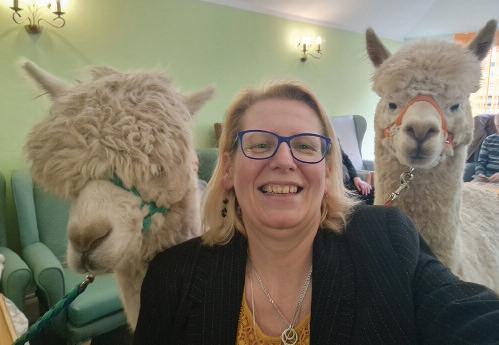
during the anima therapy sessions it is double beneficial to our residents
“We have one to one close experiences booked for one of our animal lovers as a bucket list wish in close by safari park and Zoo
that pay more
The vast majority of those surveyed said better pay and recognition would make a difference to their wellbeing (89%) Safer staffing levels (82%) measures to stop bullying and harassment (68%) and a change in work pattern (58%) also scored highly along with access to a 24-hour counselling service (51%) and to a wellbeing app (49%)
UNISON head of health Helga Pile said: Many NHS staff are clearly at their limit Burnout is a reality in every part of the health service from hospital wards to ambulance stations
As more staff quit the pressures increase for those still working in the NHS and many are struggling to cope
“No one should suffer stress-related issues such as panic attacks and chest pains because of their job Employers must do more to recognise the overwhelming pressures on all NHS staff including healthcare assistants, cleaners and paramedics
The range of support available to workers experiencing mental health issues needs to be reviewed too Managers must also ensure staffing levels are safe and that employees have regular breaks ”


immigration landscape?
In today’s competitive and post-Brexit market for talent in the UK, the scarcity of skilled professionals is often a significant challenge particularly for businesses in the care industry Employing overseas workers can be a necessity yet understanding and staying compliant with the complex and ever-changing UK immigration system can be





Campaigners in Scotland have expressed concern that a loss of overseas workers due to increased red tape could have a severe and dramatic impact on social care
Scottish Care, the representative body for independent social care providers in Scotland, has conducted a survey revealing significant challenges faced by care providers in recruiting and retaining internationally recruited staff
The findings shed light on the potential risks to social care service delivery across Scotland due to recent decisions by the Home Office regarding international recruitment pathways
The survey was initiated in response to Scottish Care member reports regarding increasing difficulties in international recruitment
The Home Office’s decision to request additional documentation and communication issues exacerbated concerns among care providers particularly around Certificates of Sponsorship
Data gathered from the survey revealed several key insights:
Over 66% of Scottish Care members are currently recruiting staff from overseas indicating a heavy reliance on international recruitment pathways
However 68% of respondents expressed reluctance to consider international recruitment in the future due to concerns over sustainability and financially viability
Respondents from 14 Local Authority areas indicate that care providers employ over 15% of staff from overseas with 7 areas reporting over 25%
Alarmingly, some care providers reported between 95 – 100% of staff being internationally recruited, posing significant risks to service sustainability
Scottish Care said: “These findings highlight a serious concern over the sustainability of social care delivery in Scotland The potential loss of internationally recruited staff could intensify the existing vacancy challenges and impact overall service provision
“Scottish Care urges policymakers to address the urgent issues facing social care recruitment Immediate action is needed to protect social care service provision and support the sector s workforce
A government spokesperson said: “Care workers make a vital contribution to society, but immigration is not the long-term answer to our social care needs
“120,000 dependants accompanied 100 000 care workers in the year ending Sep 2023 and these numbers are unsustainable which is why we laid measures in Parliament to cut this figure
British Care Awards 2024
Lucy who has worked in care for over 15 years won the award for her achievements as a care co-ordinator at Baily House Care Home in Mansfield In November she was promoted to deputy manager at nearby Woodleigh Care Home
The Great British Care Awards are a celebration of excellence across the care sector and they pay tribute to those individuals who have demonstrated clear distinction within their field of work
Lucy beat off stiff competition from across the sector to win the Care Assessor / Planner award awarded to the person who can best demonstrate the vital role that assessments and agreed care plans play in ensuring the personal needs and choices of each individual are properly met

Lucy received high praise from the Great British Care Award judges who concluded:
Lucy exuded passion professionalism and enthusiasm driven
by a desire to positively impact those under her care While she displayed a strong knowledge base she remained humble on her learning journey proud of the team s achievements including innovative assessment methods Her compassion and commitment to ongoing improvement make her a valuable asset to our sector
Lucy Shaw, deputy manager at Woodleigh Care Home said: I am delighted to win this award and that the judges recognised my passion for the job that I do I absolutely love working in care as I know that we make a real and important difference to the lives of the people we look after
“It is a true privilege to care for some of our most vulnerable people and I and the wonderful team I work alongside ensure we do it to the best of our ability every day ”
Ashleigh Baird care home manager at Woodleigh Care Home said: “We are incredibly proud of Lucy for winning this award It is well-deserved recognition for all her hard work and dedication to continually deliver the best, personalised care for every person




New research has revealed that more than half of Brits regret waiting until the last minute to discuss care homes with loved ones
• 57 percent said they waited to move a loved one into a care home until after a health crisis 75 percent said that having the conversation about moving into care was very difficult
• 43 percent admitted to lying to loved ones during the process
The study by dementia care provider Vida Healthcare highlights the uncertainty around the different types of care available within the UK, with many Brits admitting to not knowing what different types of care involve Almost a quarter (23 percent) of UK adults aren t confident that they know what residential care is 24 percent aren’t sure what nursing care is, more than a quarter (28 percent) aren’t confident they know what dementia care is while almost a third (31 percent) don t know what social care or respite care involve
This lack of understanding and reluctance to discuss care options with family members often results in families delaying the inevitable – the research has revealed that more than half (57 percent) of UK adults have waited until crisis point before seeking expert care and support for their loved one This can then make the process more difficult for families as they try to avoid the tricky conversations and difficult decisions
Another contributing factor to people avoiding conversations around a loved one s care is the perceptions of care homes in the UK – a fifth (20 percent) of those surveyed said their perceptions of care homes were negative
Of adults who currently have or have previously had loved ones in care 50 percent said their family member was resistant to moving into a care home The resistance is due to several factors including missing their own home (47 percent) losing independence (36 percent) and being anxious (33 percent)
However, those who have had loved ones in care felt very differently Supportive staff (22 percent), having better care (21 percent) nicer facilities than first thought (21 percent) surprise at how nice it was (15 percent) and fantastic specialist care (12 percent) are just some of the top positives cited once a loved one was in a care home
Commenting on the results of the research James Rycroft Managing Director at Vida Healthcare said he believes that it s crucial there is a shift in the perception of care homes in the UK
“Moving a loved one into a care home can be difficult for all involved By the time someone starts considering a care home it s likely their loved one may be in need of more care than what can be provided at home, and individuals may have come to a point where they can no-longer provide the care and support their loved one needs
“Our research found that adults are often putting off conversations because of feelings of guilt – more than a third (36 percent) of UK adults that we spoke to admitted to avoiding the conversation of moving a loved one into care as they felt guilty about doing so, a stigma that we’re dedicated to challenging and changing It s important to accept that you are human and there is only so much you can do – an individual cannot provide the level of care that a dedicated care home can
The research from Vida Healthcare also reveals what people have learnt from the process of enlisting specialist care and support in hopes to help others
THE TOP FIVE REASSURANCES INCLUDE:
You can’t provide the level of care that a care facility does
You haven t failed a family member by not keeping them at home with you
You should prepare more and talk about options earlier
• You and your loved one will feel safer
Plan the move and make it as smooth as possible
James added “Family members of people living with dementia and other conditions that mean they need to move into a care home shouldn t feel like they have failed their loved one by not keeping them at home with them On the contrary, being supported by a care provider can ensure that yourself and your loved one are cared for in a respectful and dignified way that allows independence to be maintained as much as possible all the while helping to improve your loved one’s wellbeing and quality of life ”
Exemplar Health Care has started work on transforming a former care home on Westfield Lane Pontefract into a brand-new complex care service
The site is currently occupied by the former 50-bed two-unit New Haven elderly care home which will now undergo a transformative renovation led by contractor Walter Thompson Once the renovation and refit has been completed the new home will be called Hamilton Springs Hamilton Springs will support adults living with acquired brain injuries, complex mental health needs and physical disabilities providing longterm community care for adults who would otherwise have a pro-longed

stay in hospital or other inappropriate setting
Due to open in late 2024 the new home will feature 37 ensuite bedrooms split across three communities with Exemplar Health Care’s model of small group living providing a more homely supportive and responsive care environment
The home will also feature communal dining and living spaces sensory bathrooms an activities hub a therapy room and a large accessible garden These amenities are designed to enhance the overall well-being of residents and foster a sense of community within the care home


WHY IS A DETAILED FIRE SAFETY PLAN SO IMPORTANT?
It is imperative to ensure everyone can evacuate safely in the event of a fire Fire safety is crucial in minimising the risk of injury or death, even more so in care homes as each resident will have individual needs such as dementia or reduced mobility that may require additional planning training, and allocation of staff roles
Not having a detailed plan and regular training could jeopardise the safety of the vulnerable people we care for Breaches of regulations can also lead to fines for care providers
There are statutory requirements we must follow including having regularly updated fire safety planning risk assessments and evacuation plans The Care Quality Commission (CQC) requires that all care home staff have fire safety training
WHY DID YOU ENGAGE WITH A LOCAL FIREFIGHTER AS PART OF YOUR TRAINING?
Obtaining expert technical advice on the application and interpretation of fire safety guidance is central to our procedures We ensure that staff understand the importance of this as fires can spread quickly, risk lives and cause immense damage
We renew our fire training annually and this year we were joined by a fire safety consultant and professional firefighter from a Nottinghamshire fire station to hear his expert views We learnt how to put out a fire efficiently and safely and heard real-life examples of the fires his crew had responded to and their causes
We then had a practical demonstration outside, putting out a fire using water foam, CO2, dry powder and wet chemical extinguishers That was helpful as people can often be anxious about using them
It was a detailed and informative session and we had excellent feedback from staff who have also applied some of the advice at home, such as ensuring their smoke alarms are working
HOW OFTEN DO YOU HOLD FIRE SAFETY TRAINING SESSIONS?
We conduct annual and refresher sessions and all our new colleagues receive training on arrival We also have nominated fire marshals
Staff are trained to evacuate the building immediately in line with the home s plan going to the nearest designated fire assembly point while remaining as calm as possible and helping others
They are also trained in fire prevention measures and emergency procedures and have regular drills
WHAT OTHER FIRE SAFETY PRECAUTIONS SHOULD A CARE HOME TAKE?
Our up-to-date fire risk assessment is reviewed regularly and the fire alarm system that runs throughout each home is fully serviced We also ensure:
Regular fire alarm and escape lighting tests
• Regular inspections of fire safety equipment
The correct fire extinguishers are in the right places and the fully operational fire doors are checked regularly - these can slow the speed of the fire spreading
• Each home has trained and nominated staff to assist with evacuation in each part of the building
The firebox in each manager s office includes equipment such as two-way radios torches and reflective jackets
WHAT REGULATIONS MUST YOU ABIDE BY?
Fire safety regulations for UK care homes are primarily governed by the Regulatory Reform (Fire Safety)
Order 2005 which places responsibilities on those involved in fire safety such as registered managers The primary duty is with the care provider as the employer known as the ‘responsible person’ and you can read specialist guidance here
The CQC assesses fire safety as part of its inspections; care homes that fail to comply with its fire service recommendations could see their CQC rating affected
WHAT EXTRA MEASURES ARE NEEDED IN A DEMENTIA SPECIALIST CARE HOME?
The evacuation of residents in the event of a fire, especially at night, can be challenging People might not be very mobile so staff need to help each person while avoiding confusing them
Our fireboxes contain the details of all residents and their level of mobility and dependency They are moved horizontally to a safe area, ahead of the fire, which gives staff enough time to reach everyone Wheelchairs or medical beds must pass freely through all doors
Knowing their loved ones are well looked after in their care home is of the utmost importance to families
That’s why fire safety is vital to our procedures and staff training keeping our staff and family members safe and building trust in those that use our service

The National Association for Safety and Health in Care Services (NASHiCS) focuses on all Health and Safety matters affecting the social care sector The association has gone from strength to strength since its inception and has a growing membership across many care providers and organisations covering the UK
Keeping up to date regarding Health and Safety matters is vital The more you know the more you can plan and the more you plan the less you are susceptible in turbulent times to both internal and external risks
Through the association you can Network with colleagues responsible for Health and Safety share your own best practice experiences and hear how others have overcome challenges
Source dedicated events on health and safety in the sector and participate in national and local Networkers Conferences Seminars in-person or virtual webinars
Advertise job vacancies and benefit from favourable member offers and rates from suppliers of goods services and equipment

Receive regular update emails covering latest developments and safety alerts/news; while giving access to current information links on key safety topics; and monthly our highly praised e-News
Matters covered range from fire safety training infection control lone working falls prevention first aid to stress legionella case law regulation people moving people and mock courts to mention just a few See our website for information on past as well as future events – www nashics org
We have developed national links with other organisations, government bodies, regulators and enforcement agencies Our aim is to promote and improve safety and health in care practice by providing a sharing and networking forum for debate, and discussion Joining NASHiCS is a great and easy way to keep informed and aware Health and Safety is an essential element in the workplace and matters to everyone involved with social care now and in the
awards on behalf of all the brilliant people who make up Barchester and who continue to go above and beyond to deliver the most excellent care
It is no mean feat to consistently win the award for the entire healthcare sector ” Julia Small, RoSPA’s Achievements Director, said: “This is a fantastic and well-deserved accomplishment
All our award entrants demonstrate their unwavering commitment and passion for keeping people safe at work By receiving this recognition Barchester join likeminded businesses and organisations worldwide who represent the very best in their approach to Health and Safety I would like to add my personal thanks for all the work that it has taken to secure this well-deserved award – congratulations to all those involved who champion and drive up Health and Safety standards every day You are a fantastic example to others in your sector
For more information about the RoSPA Awards visit www rospa com/awards
Meadow House care home situated in the heart of Swaffham announced the recent fulfilment of a lifelong dream for one of its residents, Nathan Nathan, alongside home manager Joanna Jankowska, enjoyed a thrilling football match at Anfield Stadium, home of Liverpool Football Club This remarkable experience was made possible through the Wish Mailbox initiative brought forward by Joanna and the rest of the team at Meadow House

After opening the wish mailbox the team learned of Nathan s dream to see his favourite team Liverpool play live
They embarked on an unforgettable journey to Liverpool where he was welcomed with open arms at Anfield Stadium The excitement in the air was palpable as thousands of fans eagerly awaited kick-off
The football match was in fact a special charity
event named ‘Legends Between the two teams Liverpool and Ajax there was an array of starstudded players On the pitch there was Liverpool’s revered captain, Steven Gerrard, amongst other renowned stars such as Fernando Torres and Daniel Agger
As the match unfolded Nathan s face lit up with sheer joy and excitement cheering on his beloved team with unwavering enthusiasm
The electrifying atmosphere of the stadium coupled with the favourable result of the game of the game created an unforgettable experience that Nathan will cherish forever
Reflecting on the day Nathan expressed his gratitude for the opportunity to fulfil his dream describing it as amazing The smiles captured in the photos from the trip are a testament to the sheer happiness felt by Nathan








Every so often you hit on an idea that flies beyond your wildest expectations, and we at Sambrook House believe that a good idea should be shared which is why we are delighted to share the story with the readers of THE CARER
We all know that most people who visit or work in a Care Home just see a collection of older people living their lives in hopefully a tranquil and caring community What they don’t see is the lives these people have lived and what they have achieved or contributed We at Sambrook House set out to put this right with an EXHIBITION of our resident s life works and achievements and we were amazed at the talent and experiences we uncovered!
Preparation was key and we spoke to every resident and every family to see if we could showcase an achievement hobby award career highlight or similar We then wrote and collated their stories and gathered the many precious items to create their exhibit, borrowing display stands from the village hall, and begging the artistic talents of the president and chair of our local WI who created the wonderful display Every person’s exhibit was accompanied by an A4 page of explanation and these were all collated into a free A5 catalogue of the exhibition We left out a visitor s book and the comments were truly heartwarming
We uncovered some extraordinary stories: Edna our 102-year-old was the subject of a chapter in a book [‘All the things you are by Kenneth Ballantyne] detailing her wartime exploits as a volunteer fireman in Peterborough We have Di who had been a ballet dancer in her youth, and our two twin ladies Lil and Mary who shared their wedding day! We found Lindsey had been a serial ‘best garden in Cheswardine’ winner and Mary
was (and is) the most amazing knitter who was also awarded the Imperial Service Medal for her services to the Central Ordinance Depot We
have 3 pianists and a lady called June that has created the most exquisite embroidery (showcasing the wonderful banner that she made for St Nicholas Church in Newport) We displayed campaign medals and coin collections paintings pottery, and embroidered table cloths, alongside a section of the care home s current activities and creations which are fantastic!

We launched our exhibition on Good Friday with cream teas and Prosecco and it remained open until the following Tuesday We had around 100 visitors from families and friends to local Villagers and WI members many of whom lingered for around and hour to read all the stories
This wonderful exhibition put all our residents absolutely centre stage and you cannot put a price on the pride they felt, the conversations that are still going on, the memories that were triggered the family photo opportunities and the fact that families learnt a bit about each other It has really brought the whole home community closer together as well as creating a lot of village interest

The excitement is building as CleanEx2024 – the only UK exhibition dedicated to the laundry and textile care industry – looks to set records when the doors open at Ascot Racecourse on Sunday 28 April and Monday 29 April
CleanEx encompasses every facet of the industry and since its inception in 2012 the biennial event has grown enormously New equipment launched machinery demonstrations – in fact everything from detergents to large washers dryers to bed linen can be seen and compared This exhibition includes the biggest names in the sector alongside newer entrants keen to show off their ingenuity and showcase products This year sustainability and products which save time and energy are expected to draw a wide audience
CleanEx 2024 like its successful predecessors attracts visitors from across the UK and the rest of the world
Virtually all attendees have buyer power within their organisation and are looking to make the most of this
valuable opportunity
Neil Robson company Director said I can sum this up as being a lot of hard work to stage (timewise not cost) but it has been one of the most rewarding activities we have done in our 19 years of ownership It is hard to put into words the level of engagement and excitement the exhibition created and it has given residents staff and families some fascinating insights and conversation starters We wanted to share our experience because, just occasionally an idea turns out to be so much better and more rewarding the we could have ever imagined!
Organiser Mark Gleed says: I am very excited for the sixth edition of CleanEx and know from the massive interest that the 2024 exhibition is going to see deals done and create talking points in the years to come We can t wait –and neither can those attending as exhibitors or visitors ” It s very easy to register for Cleanex 2024 Just go to https://cleanex ecreg uk/ where you can download an information pack Ascot Racecourse the prestigious venue is ideally placed for visitors It’s close to Ascot train station and just a short distance from central London and major road networks linking the rest of the UK We look forward to seeing you there!
See the advert below for further details


Two world-class research teams will carry out countrywide trials to identify accurate and quick blood tests that can diagnose dementia, in a bid to improve the UK s shocking diagnosis rate
Research teams at University College London, and Dementias Platform UK based at the University of Oxford will capitalise on recent breakthroughs in potential dementia blood tests and generate the evidence needed for them to be validated for use in the NHS within the next 5 years
The teams make up the Blood Biomarker Challenge – a multi-million pound award given by Alzheimer s Society Alzheimer s Research UK and the National Institute for Health and Care Research and Gates Ventures including £5m raised by players of People s Postcode Lottery The project aims to revolutionise dementia diagnosis
Both teams will recruit participants from sites spread across the country to ensure their findings are applicable to the whole of the UK s diverse population
Timely and accurate diagnosis of the diseases that cause dementia such as Alzheimer’s disease, is crucial as it means people can access vital care and support and take part in medical research This will be even more imperative if new treatments are approved for use in the NHS as these work best for people in the earliest stage of their disease
Currently people are usually diagnosed using memory tests and brain scans These are less accurate than gold standard tests like PET scans or lumbar punctures, which can confirm what type of dementia they have However only 2% of people can access these specialist tests
In recent years a number of different blood tests that can diagnose Alzheimer’s disease and other causes of dementia have shown very promising results in research settings But they have yet to be tested widely in clinical settings in the UK
The READ-OUT* team will be led by Dr Vanessa Raymont, Professor James Rowe and Dr Ivan Koychev with Dementias Platform UK researchers from the Universities of Oxford and Cambridge They will test multiple existing and novel blood tests looking at a range of types of dementia including Alzheimer’s disease vascular dementia frontotemporal dementia and dementia with Lewy bodies The researchers will also look at whether the blood tests can help detect these diseases at various stages
Led by Professor Jonathan Schott and Dr Ashvini Keshavan at University College London, the ADAPT team** will focus on the most promising biomarker for Alzheimer s disease called p-tau217 This reflects levels of two hallmark proteins found inside the brain in Alzheimer s disease – amyloid and tau The researchers will carry out a clinical trial to see whether measuring p-tau217 in the blood increases the rate of diagnosis for Alzheimer’s disease both in people with early dementia but also in those with mild progressive problems with mem-

ory
These complementary research approaches will maximise the chances of providing the evidence needed to prove that blood tests are ready for use in the NHS They will pave the way for them to be made available to all who might benefit within the next 5 years
With more than half of all local authority districts in England failing to meet the government’s target dementia diagnosis rate of 66 7% and with new drugs on the horizon which appear to slow early Alzheimer s disease experts from both charities and the research teams agree that change is needed
Professor Jonathan Schott Alzheimer s Research UK Chief Medical Officer and Professor of Neurology, UCL Queen Square Institute of Neurology said: An early accurate diagnosis of Alzheimer s disease is already important allowing people to access to appropriate care and medications If as we hope new treatments that can slow down Alzheimer s disease become available soon then this will be vital This would pave the way for fair and equitable access to new and potentially life-changing treatments to all who might benefit ”
Dr Vanessa Raymont Associate Director Dementias Platform UK and Senior Clinical Researcher, University of Oxford, said Since I first stepped into a memory clinic 30 years ago there has thankfully been a shift in the way society thinks about dementia There was previously a feeling that this was just another part of aging but now we re seeing that people want to know more about their condition and they want a diagnosis as it helps them access the support they need Both my parents lived with dementia so I know firsthand the devastation this disease causes and how a timely and accurate diagnosis can benefit people and their families ”
Fiona Carragher Director of Research and Influencing at Alzheimer s Society said: Dementia is the UK s biggest killer yet a third of people living with dementia don’t have a diagno-
sis which means they re not able to access care and support An early and accurate diagnosis is also going to be vital in the future for identifying people who are most likely to benefit from new treatments which are now within reach
At the moment only 2% of people with dementia can access the specialised tests needed to demonstrate eligibility for new treatments leading to unnecessary delays worry and uncertainty Blood tests are part of the answer to this problem – they re quick easy to administer and cheaper than current, more complex tests I’ve spent decades working in research and the NHS and after years of slow progress it feels like we’re on the cusp of a new chapter on how we treat dementia in this country



and adult social care from last year the themes from which have featured heavily in the government s latest research briefing on the sector
A ‘care gridlock’ remains, in part, due to delayed hospital discharge affected by capacity challenges in social care this combined with staff shortages means providers are actually having to turn down admissions
However the last 12 months have been worsened by the cost-of-living crisis impacting on providers’ ability to pay for staff and services in line with inflation as well as rising energy costs with some providers citing increases of as much as 350% Unfortunately, these factors are making recruitment and retention even more difficult
The repeated findings from the likes of Care England and CQC paint a challenging picture for social care providers Alongside a need for increased sustainable funding into care services to tackle these issues we should consider how technology can play its part
Recruiting and retaining staff
Recruitment and retention of staff is a leading challenge affecting care access with poor perceptions of the industry playing a key role
Our customers tell us they feel overworked exhausted and stressed sometimes to the point of becoming ill injured or leaving their job altogether And whilst this year’s rise in the national living wage is a positive step for workers they need continued support to manage their workloads and look after their wellbeing
A part of the solution could include home care rostering and scheduling software or medication management and communication tools Each can help to release time from unnecessarily manual administrative processes freeing up time to care for individuals and helping staff to feel less overwhelmed by their workload Smart rostering of who supports which client can also reduce travel time, which in turn helps reduce the provider s carbon footprint and reduce the day-to-day travel expenditure for staff These kinds of changes alongside action from government through things like the Care Workforce Pathway are great steps forward to empower workers improve perception of the sector and boost recruitment
Homecare Supported Living and residential services often use our planning solution to produce personalised digital care plans record observations and identify trends and warning signs New Directions a specialist autism and mental health community support service said that using the solution has saved staff time reduced stress, and allowed them to spend more time with service users They believe that having the digital analysis and reports also helped them to achieve an outstanding CQC rating
Improving home care
Significant inroads to the ‘care gridlock’ can also be alleviated by introducing efficiencies into the delivery of home care which has been proven to help minimise and in some cases mitigate the need for people to require residential or hospital care in the future
Individuals can sleep in their own beds eat the food they like and be with their friends and family However, it can be difficult to deliver these services to everyone when demand outstrips the capacity of the workforce and providers are having to hand back contracts By implementing technologies such as digital brokerage systems we’ve seen the time taken to deliver homecare services reduce by 35%, by improving the hospital discharge process Similarly the use of technology enabled care means individuals can be discharged from hospital sooner as they receive appropriate levels of care at home The use of smart sensors linked to intuitive software means care teams can be alerted to urgent issues or spot unusual habits/patterns and prioritise the workforce and home visits accordingly
Levelling up
This type of digitisation allows providers to reduce administrative burdens and give time back to staff which is vital for addressing the fundamental issues facing the industry However, it is important to remember that care providers are at different stages of digital maturity This can be due to a lack of adequate funding or integration and incompatibility between systems
To help tackle this variation providers should prioritise implementing digital care records It’s the most effective way of joining up the care journey and providing services that are centred around the individual and why government set a target for 80% of social care providers to have one in place by the end of March 2024
Having a system that provides a holistic view of service users will enable population health management, provide a better understanding of demographic variation and enable care to be more evenly distributed to reduce health inequalities And with applications open for the latest wave of funding through the Digitising Social Care programme there are new opportunities for this type of levelling up
To determine the best approach to this type of digitisation a strategy is vital It should be set around a strong vision and goals with a long-term approach that considers what is needed now and how needs might evolve over the next five years and beyond And crucially who to involve to make it happen Budgets are tight, so it is important to have a roadmap of what, when and how these changes are going to be made, and with what funding
Digital as an enabler
Digital should always be used to enhance not replace services to allow people to receive care in the way that suits them and is medically safe All the while it should reduce care worker time spent on unnecessary tasks enabling them to work smarter not harder and spend more time with their clients And having aligned informed strategic digital goals and sharing efforts across organisations will ensure technology can play and important part in addressing the issues that persist, and make sure care can be delivered to the most vulnerable in our society in a safe and efficient way





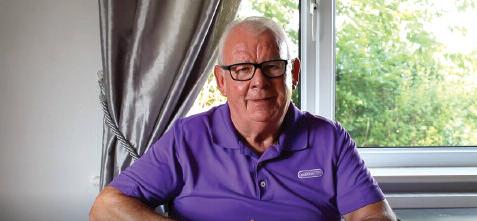
if
use it
take photos
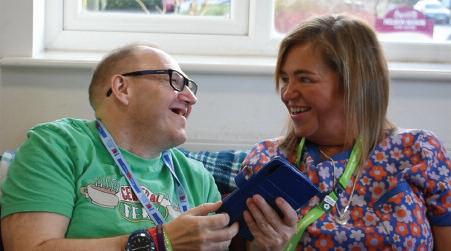
his own Andrew, Anthony's Support Worker said: "He got used to navigating around the phone really quickly and it s been amazing to see Anthony pursue his passion in photography be creative and build his own albums of memories with photos he has taken himself Seeing how quickly Anthony responded to the technology his team organised the purchase of Anthony s own phone and for him to try out a smartwatch from the library
His Support Worker said: “Although Anthony faces challenges in reading and writing, he found motivation in tracking the increasing numbers on his smartwatch as a measure of his daily progress He is now much more enthusiastic about going outside and wants to go on walks every day and his fitness and mood have improved
“He wouldn’t have had the opportunity to test out these items if it wasn’t for the Tech Lending Library Both the smartphone and watch have improved his mood physical wellbeing and confidence which has been amazing to see
STELLA’S STORY

Stella, 70, who is supported for a mental health condition in Liverpool borrowed a robotic dog from the library to support her with loneliness and anxiety
Stella who had a dog when she was younger said: I stroke him he talks and I talk back to him and he makes me not be lonely ”
WATCH:
https://www youtube com/watch?v cyq50S5m5h8
Animal-assisted therapy which includes robotic pet technology as well as live animals has been proven
to have a positive impact on depression loneliness and anxiety
Carol Toner Head of Business Development said: “We’re proud to offer the people we support the opportunity to try out tech they wouldn t have had the opportunity to use otherwise
“We understand the pivotal role tech plays breaking down barriers and fostering independence for individuals like Anthony and Stella and we are continuously adding to our collection to further enhance the lives of the people we support ”
SARAH’S STORY
In April 2021 AFG were awarded the support package for Sarah a woman with a diagnosis of cerebral palsy a learning disability and dysphagia She is also non-verbal
Following breakdowns of previous support Sarah s team were chosen carefully by skills matching them to Sarah’s needs They built a trusting relationship with her and her family and worked in close partnership with her multi-disciplinary team to ensure her positive behaviour support plans were followed
They worked with her to understand her communication methods signals and tools, which included eye gaze technology and picture cards As Sarah settled into her home and built up a good relationship with the team, she was able to communicate what she wanted and the team understand her needs

Sarah was initially severely underweight and required meal supplements with close monitoring of her weight and diet As her communication with her support team improved she was able to tell them exactly what she wanted for her meals and she gained weight due to eating a healthy balanced diet and no longer needing meal supplements
With support from AFG and her Speech and Language Therapy team, Sarah passed an assessment for an advanced communication tool which has completely transformed her life The tool allows Sarah to communicate with full sentences rather than being limited to ‘yes’ or ‘no’ answers as she was before
Using their knowledge of Sarah her team have added personalised options to the device including what she likes to eat and her favourite activities, meaning she can now have meaningful conversations She communicates effectively with her support team and family and expresses her personality for example by making jokes – when she asked for one of the team to do something for her while they were busy she used the tool to say “Am I talking to myself?”
Sarah s life looks completely different now she is able to fully express herself and enjoy a range of hobbies and activities
Using an advanced communication tool which she had not passed the assessment for previously she is now able to express her personality and communicate effectively
Where she had previously been underweight on meal supplements and receiving ongoing support from her Speech and Language Therapy Support team she has now been discharged from the team has gained weight and eats a healthy and balanced diet
Sarah is supported to attend a range of activities in the community including discos boxing and hydrotherapy swimming A year into her support with AFG, Sarah attended a review meeting where she was asked to give a mark for her mental and physical health and she gave the highest mark possible
M-Resourcing are delighted to announce the appointment of Dan Ashenden to lead our M-Resourcing service with effect from 1 December 2023
M-Resourcing offers a multi-faceted approach to solving complexresourcing problems facing the care sector Whether you facespiralling staffing costs and pressures, or simply require a newapproach to managing this critical area for your organisation, ourcomprehensive resourcing solution reduces costs brings controland allows you to plan for the future with confidence
We knowfrom talking to our clients that managing their resourcing costs isstill a key priority and this important appointment underlines ourcontinuing commitment to the sector

Christoph Marr CEO of Marr Procurement Dan is a highly-capable leader and has incredibly valuable experiencefrom his years in the care sector managing and delivering complex temporary labour



The Belmont care home in Worcester has announced its innovative intergenerational initiative aimed at fostering meaningful connections between residents and the local community Every Wednesday, residents from The Belmont eagerly join children at North Worcester Primary Academy for a special story time session marking a weekly event that has become a highlight for all involved
The intergenerational story time program pairs residents with children, allowing them to share the joy of reading and learning together Each week a group of residents join the children creating a nurturing environment for building relationships and promoting mutual understanding
Since its launch in 2023 the intergenerational story time has had a profound impact on both residents and children Sandie noted “This has had a massive impact on both the residents involved and the children They have created a special bond between them and made friends in a way that gives both parties a sense of wellbeing and joy
The benefits of intergenerational connections extend beyond mere social interaction Sandie emphasized Intergenerational activities can be so beneficial to both our residents and children It helps build confidence tackle social isolation and loneliness in both groups
Commenting on the initiative Sandie Preece Home Manager of The Belmont highlighted the collaborative efforts that made this program possible The well-being lead at The Belmont created such a wonderful connection with the local primary school North Worcester Primary Academy, and came up with the idea of taking a small amount of our residents to the children once a week to listen to them read ”
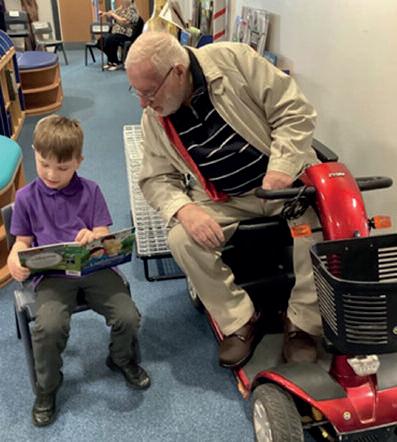
One of the dining

and great grandchildren here and we were so happy to accommodate all of them “Some of her family arrived from Australia so we made sure she has a lasting memory of the day by printing out a family photo and framing it for her “The dining room was decked with balloons, banners and birthday themed tablecloths
“It was so nice to be a part of Kath’s big day and it was worth all the preparation it took
“Our kitchen staff prepared a lovely meal and most importantly Kath had a great time and told us she loved the day
From their first operational centre in Hampton Hill Lura Care will be in a position to provide dental services to centres located in London South East and part of East England
Lura Care a company specialising in dental care services for care homes and day centres has opened its first operational centre in the United Kingdom in Hampton Hill London Their objective is to break the mobility barrier to care for dependent people or people with mobility problems who, due to their condition cannot access the oral health services they need
Lura Care has developed an innovative model of mobile dental services that adapts to the specific needs of its patients whereby its specialised and highly skilled teams carry out the treatments on-site to avoid inconvenient transfers to clinics wherever possible

The company who are registered with the Care Quality Commission also carry out free no-obligation initial assessments on-site to evaluate the oral health condition of residents and their dental care needs as well as training activities in care homes to help promote preventative health and healthy habits
As a social impact company Lura Care is committed to advancing towards the Sustainable Development

Goals by promoting of good health and well-being (SDG 3) the reduction of inequalities (SDG 10) and the impulse of partnerships to achieve goals (SDG 17) as well as fighting the phenomenon of ageism that relegates millions of older people and restricts their rights to enjoy a full life with an optimal quality of life
With this objective the company offers flexible and interest-free financing options for treatments so that no person is left without the care they need for financial reasons, and reinvests a portion of the revenue back into the centres through bonuses to help improve their services
Founded in Barcelona, Spain, and also at present in Italy, Lura Care has provided their services to more than 1 000 care homes and day centres and has attended to more than 100 000 patients since the company was founded in 2015 From their first operational centre in Hampton Hill they will be in a position to provide dental services to centres located in London South East and part of East England Lura Care is registered with the Care Quality Commission For more information about the company please visit www luracare co uk See the advert on the facing page for details


Quiche casseroles and carrot cake are our favourite nostalgic meals
A poll of 2,000 adults found a third often eat foods specifically to remind them of years gone by with 52 per cent associating particular foodstuffs with past times in their lives
With chicken Kiev prawn cocktail and Battenberg cake also among the meals linked to yesteryears
It also emerged only 35 per cent still use old family recipes that have been handed down through the generations
In response to these findings care home provider Care UK has created a collection of nostalgic recipes dating back from the 1950s through to today with the help of its residents in care homes across the country
Andrew Mussett hotel services manager said: Nostalgia is a powerful force that connects us to our past, and what better way to relive those cherished moments than through the comforting embrace of familiar foods served up in family favourite recipes passed down through the generations?
“Whether it's the aroma of a family recipe or the first bite of a childhood treat nostalgic foods have the power to evoke happy memories and emotions and are a wonderful way to encourage reminiscence in older people especially for those living with dementia
“A home-cooked meal using a recipe enjoyed in the past creates an opportunity to remember the past and reflect on the people and places which inspired the dish ”
Of those who cook nostalgia-fuelled meals 28 per cent will do so when family come over, 26 per cent when a birthday rolls around, and 22 per cent when they just need cheering up
But some traditional foods may be on the verge of extinction, as beef topped a list of ingredients people buy less of now than they did five years ago
Pork is also dropping in popularity along with seafoods including cod haddock and prawns
On the other hand Brits are buying more chicken eggs and fruit to maximise their protein and vitamin intakes

The poll found that in the last 12 months, 70 per cent of respondents have tucked into a classic Sunday roast and 58 per cent have enjoyed a Shepherd’s or Cottage Pie – proving not all recipes first enjoyed in the 70s are going out of flavour
Other dishes to have passed the nation’s lips in the last year include ham egg and chips (28 per cent) and toad in the hole (29 per cent)
Nearly half (49 per cent) have enjoyed a classic 1970s staple – a quiche – while 32 per cent have enjoyed the garlicky goodness of a chicken Kiev
And when it comes to popular foods from the 1990s, 43 per cent have laid into some macaroni and cheese while 36 per cent have snacked on a Pot Noodle
As a result 57 per cent express little or no concern that classic or traditional meals are at risk of dying out completely
Although 34 per cent do fear this may come to pass according to the OnePoll com figures
Of those who are parents, 46 per cent cook meals for their children
they enjoyed in their own youth at least sometimes
But 62 per cent believe their eating habits have changed as they have aged, with 65 per cent of these trying to eat more healthily and 45 per cent looking to be more adventurous
Andrew Mussett added: There s a certain joy in rediscovering the flavours of our childhood or the meals shared with loved ones
Nostalgic foods offer a unique blend of taste and emotion creating a culinary journey that resonates with the essence of who we are where we ve come from and the people with whom we’ve enjoyed meals with throughout our lives
And while tastes may change or evolve with time it looks like lots of British classics are here to stay – which is why we ve created our Recipes to Remember book
“From food enjoyed during World War Two to quirky desserts from the 70s, it includes residents’ favourite foods, alongside recipes tailored to older people by some of our award-winning chefs ”
TOP 15 FAVOURITE NOSTALGIC MEALS
Quiche
Casseroles
Carrot cake
Chicken Kiev
Prawn cocktail
Crepes
Battenberg cake
Black forest gateau
Angel delight
Tinned pudding
Vol-au-vent
Pineapple chicken
Fondue
Devilled eggs
Pasta primavera

When John Cutting’s mother Violet moved into a dementia care home in Wellington he was regularly accompanied on his visits by his 10 year old Alsatian dog Prince and this proved to be the start of an ongoing involvement between John, his dogs and the care home
Sadly, Violet passed away in 2020, followed by Prince in 2021 but dog-lover John acquired an Alsatian puppy Rex later that year and last May he resumed his visits to Camelot House and Lodge for the benefit of the other residents
John said: Dogs have always been a huge part of my life and seeing Prince, being able to stroke him and talk to him, brought so much pleasure to my mum and the other residents
“It was seeing the benefits to residents that inspired me to start volunteering with Therapy Dogs Nationwide with Rex Therapy Dogs Nationwide assesses volunteers’ dogs to make sure they are sociable have a sound temperament resist the tendency to paw people and are generally suitable as therapy dogs
Research shows that interacting with a therapy dog can reduce feelings of anxiety or sadness and has a calming effect, sometimes even leading to a measurable reduction in blood pressure levels so staff at the Camelot House were keen to welcome John back with
said I met our assessor in a Tesco car park and hadn t realised she d been watching when other
people approached us and made a fuss of Rex – she could tell what a big softie he is
We had to have a second assessment before he was approved because at our first meeting she witnessed him jump up and put his paws on my chest but she said she knew he had what it takes to be a great therapy dog, and she was right!
After further training it s clear to see how sociable and reliably well-behaved Rex is and I’m so pleased to be able to share the joy of having a dog with the lovely folk at Camelot House
In his early working life, John served with the Police in Cheshire and says he always had a good working relationship with police dog-handlers and their canine colleagues
He said: I have only good things to say about the team at Camelot House and Lodge, and I fed this back to the inspector from the Care Quality Commission when one of my visits to the home coincided with theirs
“The staff are totally focused on the wellbeing of their residents: they treat them all with love and they respect their individual quirks and preferences ”

John and Rex visit Camelot House and Lodge once a month make fortnightly trips to Tiverton Hospital where they visit patients on the general wards and John has also been taking Rex to medical centre flu vaccination clinics since he was four months old
Look around and you’ll see plenty of companies offering to get the right suppliers for your business What we bring to the table is a friendly personal approach rooted in proven experience and expertise We don t just deal in services – we build connections between people At Added Value Enterprises, we’re a committed team with a passion for connecting businesses with the right suppliers

Partner with us and we ll seek out the best options for your business in a dynamic and crowded marketplace We’ll also review your existing supply chain gaining you immediate savings and new efficiencies as well as supporting you with PURCHASING SOLUTIONS FOR HEALTHCARE
Social care organisations have a lot on their plate without a supply chain review getting in the way We collaborate with social care organisations and care homes across the country, taking care of the timeconsuming details and achieving the good value they deserve
With a robust ethical highly traceable supply chain we deliver
expert food beverage and non-food purchasing solutions that save time and money That means more time to focus on what matters like supporting patient wellbeing with exceptional quality produce
Let s achieve new efficiencies today
YOUR SOCIAL CARE PURCHASING PARTNER
Social care organisations choose us as their partner because we know the requirements of this challenging field We deliver a lean, robust supply chain, that works for your patients and people In a busy market we cut through the obscurity and complicated lapartner to find the deals that matter to you achieving the quality you deserve, at a price you didn’t know were possible How’s that for a healthy supply chain?
SUSTAINABLE SOURCING
With direct access to our supply chain benefitting from instant cost savings our tailored recipe portfolio solution allows you to submit your recipespartner to input into our database
We can review your menu and check for compliance against appropriate industry criteria providing you with fully costed menus nutritionally analysed dishes and bespoke recipe books Managed Menu Solution
Our managed menu solution provides you with a complete menu solution inclusive of compliance check nutrition improvement recommendations and commercial opportunities with optional access to our online ordering portal maximising savings potential recipe portfolio solution allows you to submit your recipes to using your menu and check for compliance against appropriate industry criteria, 03330 705975

Social care organisations have a lot on their plate, without a supply chain review getting in the way We collaborate with social care organisations and care homes across the country, taking care of the time-consuming details, and achieving the good value they deserve
With a robust, ethical, highly traceable supply chain, we deliver expert food, beverage, and non-food purchasing solutions that save time and money That means more time to focus on what matters, like supporting patient wellbeing with exceptional quality produce
Let's achieve new efficiencies today
Social care organisations choose us as their partner because we know the particular requirement of this challenging field We deliver a lean robust supply chain that works for your patients and people
In a busy market, we cut through the obscurity and complicated language to find the deals that matter to you, achieving the quality you deserve, at prices you didn't know were possible
How's that for a healthy supply chain?
We know how important sourcing is to social care organisations and care homes You need to know where your food, beverages and non-food are coming from, but that often means paying more than you should
At AVE, we don't believe that there should ever be a choice between ethics and value We offer sustainable sourcing that is good for the planet and your bottom line
Achieve lean robust food and non-food supply for your social care business or care home Our purchasing experts have spent years working in the social care sector identifying the particular needs of people in this challenging field and delivering on time every time Sustainable produce better prices and the quality you deserve
inspire healthcare chefs and catering staff with quality menus and recipes that your patients will love Our food management consultants have worked with health and social care organisations and care homes across the UK, crafting bespoke menus that deliver on price and taste We ll even help you navigate the tricky territory of special diets and allergens with ease
Catering can be tricky to go at alone Why not partner up? Trust us to lend a specialist hand across every aspect of your food operation, and guarantee the best results - safety and sustainability assured
Is your business ready for the new flexible working and family friendly rights that came into force from 6 April?
With a raft of employment law changes being introduced in 2024 it s hard to keep up with the latest developments and understand your obligations as an employer and how you can best support your staff To help you navigate the most recent developments, here is a set of FAQs with practical guidance for dealing with these
Changes to flexible working requests – From 6 April 2024, new rules around statutory flexible working requests came into force This has changed how employees make flexible working requests and how you need to handle them In this FAQ we cover all the changes and what they mean for your business
• Carer’s leave: new rights for carers to unpaid time off – Discover the recent updates which grant employees the right to take unpaid carer’s leave to support dependents with long-term care needs This

FAQ clarifies these changes and provides practical guidance for employers navigating these adjustments
Extended redundancy protection for employees on maternity, adoption or shared parental leave – This
FAQ explains the new legal protection for pregnant employees as well as those returning from maternity adoption or shared parental leave and will help you to ensure your policies align with these vital legal safeguards
to Statutory Paternity Leave – Effective 8 March 2024 and applicable to children whose week of birth or placement for adoption is on or after 6 April 2024 this FAQ covers the changes to statutory paternity leave and how it reshapes how and when this leave can be taken
To help you navigate the wider scope of UK employment law changes in 2024 and what they mean for your business, you may also be interested in watching an on-demand webinar in which the employment team at Harper James covers a number of issues:
Key cases of 2023: Potential implications for your business
What to expect in 2024: The key changes and how these will affect your business
Working hours - flexibility vs uncertainty: Changes to flexible working overview
Changes to discrimination law: Including maternity breastfeeding and disability
More rights for families: Miscarriage Leave Bill and The Carers Leave Act
Holiday pay: Legislative changes coming in 2024
To watch this webinar on-demand and to receive an article about the key employment law changes in 2024 and what they mean for your business please visit the Harper James website - https://harperjames co uk/news/webinar-employment-law-in-2024/
The staff and residents at Elm Bank care home in Kettering had an afternoon of karaoke fun
We all know the impact music can have on a person s mental wellbeing the residents at Elm Bank, are always keen to try something new An afternoon of fun was had by all with Kaleidoscope Karaoke delivered by Becky Prendergast The residents enjoyed the array of different props and engaged fully with letting themselves go with singing heard all around the home Each song got all singing and their feet moving to all their favourites It is just amazing to see how music lifts spirits creates joy and allows for all residents to reminisce on memories past
Resident at Elm Bank said “it is wonderful we can all sing along as the words were clear to see and the fun we had was super”
Marvellous Bindura General Manager said "Music is important to many of our residents and helps are residents in many ways it is lovely to see the residents engaged and joining in with songs”
Our varied life enrichment programme keeps residents active and provides a daily choice of engaging physical, mental and spiritual activities tailored to residents’ interests and abilities


A large Canadian research study published 3rd April in the scientific journal Neurology has reported that women with an earlier onset of menopause and higher risk of cardiovascular disease show signs of reduced cognitive function
Previous studies have shown that that things like high blood pressure and smoking can cause cardiovascular disease and this can damage the brain leading to increased cognitive decline and an increased risk of developing dementia
The researchers of this study set out to understand more about the role that menopause and hormones might play and how this might be influenced by other risk factors
Over 8 000 women were involved as part of the Canadian Longitudinal Study on Ageing and compared them to men who were the same age The researchers analysed health information including factors that may impact a person s cardiovascular health including high blood pressure cholesterol diabetes obesity and smoking To measure cognitive function participants took part in memory and thinking tests both at the beginning of the study and 3 years later
Speaking about the results Dr Leah Mursaleen Head of Clinical Research at Alzheimer s Research UK explained the importance of investigating this area “Research like this is vital to gain clearer insights into how changes in hormones interact with cardiovascular risk and how this influences our brain health It is
encouraging to see studies investigating how things like menopause and hormone levels influence other risk factors, as this is an area which, historically has been poorly investigated ”
The researchers defined earlier menopause as occurring before 49 years of age They included a women’s history of taking hormone replacement therapy in their analysis and it and was found not to affect the combined impact of cardiovascular risk and earlier menopause However it appeared that the link between earlier menopause and cognitive function may be reduced with use of hormone therapy
Reflecting on the results Dr Mursaleen also emphasises the need for more research to unravel how this might be happening For example it would be helpful to investigate this relationship in more diverse populations of women over a longer period of time to see how their cognition changes in later years ”
“Research has highlighted the potential for dementia risk reduction with studies suggesting that up to 40% of dementia cases could be linked to factors we can influence”, she adds
“This means there are steps we can all take to protect our brain health including keeping our brains active and staying connected Alzheimer s Research UK s Think Brain Health Check-in available to help people to find out how to make small positive changes that could help protect their brain health and potentially reduce their dementia risk
known as the festival of colours holds significant cultural importance for Hindus around the world Originating from India it symbolises the victory of good over evil and the arrival of spring Lower Meadow, recognising the significance of this celebration to their multicultural staff members, wholeheartedly embraced the festivities
We celebrated Holi a Hindu festival to welcome the colours of spring explains Jasmine, Deputy at Lower Meadow "It was a wonderful sight to see residents and staff alike coming together to partake in the festivities We began by creating Rangoli flowers with paint a tradition deeply rooted in Hindu culture as a form of prayer Then we ventured into our garden


where we joyously threw coloured powder paint, embracing the tradition of marking the arrival of spring with vibrant hues
The event was not just about celebration but also about fostering understanding and appreciation for different cultures Lower Meadow prides itself on being a multicultural hub where residents and staff from diverse backgrounds come together in harmony Embracing events like Holi allows for the sharing of traditions creating an environment of inclusivity and mutual respect
Our home is a melting pot of cultures and it s essential for us to honour and celebrate the traditions of all our residents and staff members adds Jasmine "The Holi celebration was a great success at our home It truly felt like a community event with people of all cultures joining in to celebrate this day Yes we made a huge mess but we had a fantastic time letting loose and immersing ourselves in the joy of the moment "











days unpaid leave when the new Carer s Leave Act comes into force on Saturday 6th April 2024
New analysis of Census 2021 data by Carers UK shows that there are around 1 6 million people in full-time employment in England and Wales who were also looking after someone who is elderly disabled or with a longterm health condition and 948 000 people in part-time employment who were also unpaid carers
The new rights are particularly important as previous Carers UK research shows around 600 people a day give up work to care due to a lack of flexibility and support

With 317,000 directors, managers and senior staff juggling employment and caring responsibilities this is an issue faced by employees throughout organisations from the Board to the most junior member of staff
The sectors with the highest numbers of unpaid carers set to benefit from these rights are public administration education and health (976 000) This is followed by distribution hotels and restaurants sector (443 000) and financial real estate professional and administrative (396 000)
In terms of job role 19% of people in employment who are unpaid carers are in professional occupations and 14% in caring, leisure and other service occupations
For the first time employees who are carers will be able to take up to 5 days unpaid leave to better balance work with caring responsibilities each year Employees can take time off in full or half days, or in a whole block of five days Those taking time off will have the same employment protection associated with other forms of family-related leave such as protection from dismissal as a result of having taken the leave Charity Carers UK which led the campaign for those juggling work and unpaid care has seen support for the new legislation from employers unpaid carers other stakeholders unions representative bodies and unpaid carers
Helen Walker Chief Executive of Carers UK said
“Now every employer in the country must recognise carers in the workplace employees can be confident speaking about their caring role – kickstarting a crucial conversation about the support they need to stay in work, which matters not just for carers but for employers and the economy too
Chris O’Shea, Group Chief Executive at Centrica, owner of British Gas, said: Carers do amazing work most of it unseen Juggling a job and caring can be a real struggle emotionally and financially which is why we’ve worked with Carers UK for the last twenty years to help demonstrate the economic case for supporting carers in the workplace
“At Centrica we provide paid carer’s leave flexible working and a support network for our working carers Not only is it the right thing to do there is a clear business case for supporting carers, including better colleague satisfaction and retention The introduction of five days statutory carer s leave through the Carer s Leave Act is a great step forward and will make an enormous difference to all working carers in the UK’ ”
Wendy Chamberlain MP who introduced the Carer s Leave Bill in the House of Commons said
“It has been a long process since I first presented my Private Member’s Bill in 2022 but I am so excited that 6th April has finally arrived which means that the Carer’s Act will come into force This is vital progress in improving carers employment rights and will help to offer some more flexibility to balance work and caring
Becoming a carer is something that can happen to any one of us It can take many forms: from day-today physical caring, making medical appointments or doing the shopping for a housebound elderly neighbour Caring or being cared for is something that almost everyone will experience at some point in their life
“The work unpaid carers do is so vital yet is it extremely underappreciated This hard work should be better recognised which is a key reason why I led the Carer’s Leave Act through Parliament The Act gives carers up to 5 days of unpaid leave a year
“The Carer’s Leave Act coming into force is a huge step forward for millions of carers which recognises the vital importance of their caring role and empowers them to ask for support in the workplace – in the form of unpaid Carer’s Leave – knowing that they have a legal entitlement to this Juggling work with caring responsibilities isn t easy and without the right support this can take its toll Too many skilled and valued workers are leaving employment due to the stress of balancing work and unpaid care
“I’ve met with some incredible organisations over the last two years, and I would like to deeply thank Carers UK with whom I worked closely with throughout the process of getting this bill passed It would not have been possible without their support ”
To ensure that unpaid carers are aware of their new rights under the new legislation Carers UK has created new information and advice resources which can be accessed here: https://www carersuk org/helpand-advice/work-and-career/the-carers-leave-act-2024/
To ensure employers are aware of what is required of them as employers Carers UK have created a new guide For more information visit the Employers for Carers website Millions
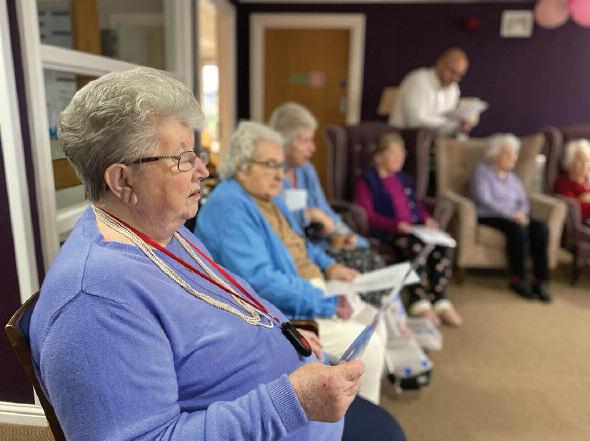




evidence requests and delays
• Best practice to manage sponsorship in this climate and stay compliant This webinar is relevant for business owners managers HR and recruitment professionals, directors and c-suite members in the care home sector to help them better understand the current challenges and upcoming changes relating to recruiting overseas workers To watch the live-recorded webinar with Fozia and Simon please visit the Harper James website - https://harperjames co uk/news/challenges-of-employing-foreign-workers-in-care-sector/
A new luxury care home in St Neots celebrated its grand opening over champagne and canapes with Mayor Rob Simonis, Deputy Mayor Richard Slade and other guests from the
The whole team were delighted to

Reginald and Adrianne Gilmore celebrated sixty-two years of marriage together at HC-One s Mossdale Residence care home in Burnholme
Reginald and Adrianne met at a party and Mrs Gilmore jokes she was only invited along because she had a car It was love at first sight and the couple were married on the 3rd March 1967 in Upholland Parish Church on the outskirts of Wigan
The couple had very successful careers Reginald was a radiographer in a hospital and Adrianne worked as a legal and claims expert for an insurance company Mr and Mrs Gilmore have two fantastic daughters and one grandson who is 18 months old
When asked what their secret to a long and happy marriage is Reginald and Adrianne, said
We believe that a secret to a long and happy marriage is to love each other conditionally ”
Colleagues at Mossdale Residence wanted to give the couple an anniversary they would always remember Everyone enjoyed cake and reminiscing on old memories together
Julie Banks Home Manager at HC-One Mossdale Residence added: “Happy sixty-second wedding anniversary to Reginald and Adrianne, from all of us at Mossdale Residence We are so happy to have celebrated such a special day with you both ”






While Easter may have passed the spirit of giving and community engagement continues to thrive at TLC Care Homes Over the weekend, TLC Care s Cambridge Manor Cherry Hinton Camberley Manor, Cuffley Manor, Kailash Manor and Cooperscroft Care Homes extended the warmth of the holiday season through a series of heartwarming Easter Eggstravaganza that touched the lives of many In a collective effort residents team members and community came together to make a meaningful impact From Cuffley Manor Care Home, where 75 eggs were collected and donated to the Borehamwood and Potters Bar food banks, to Camberley Manor s donation of over 110 eggs to local causes such as the paediatric ward at Frimley Park Hospital and The Hope Hub Camberley the outpouring of generosity was truly remarkable Additionally our Business Development Manager at Kailash Manor Care Home Raj Kerai delivered Easter Eggs to Northwick Park Hospital s Rainbow Ward spreading joy to children in need
Care Home in collaboration with the 12 Apostles Greek Church delivered 107 Easter eggs to families in need through the church's food bank, embodying the spirit of compassion and community support This initiative epitomises TLC Care’s commitment to making a positive impact beyond their immediate surroundings, as Dawn Cawley, Business Development Manager at Cooperscroft Care Home, articulates, "Easter is a time of fun, celebration and joy and we believe every person deserves to experience the magic of the season, regardless of their circumstances Meanwhile Cambridge Manor and Cherry Hinton Care Home joined forces to bring joy to the children s wards at Addenbrooke


to staff for arranging ”






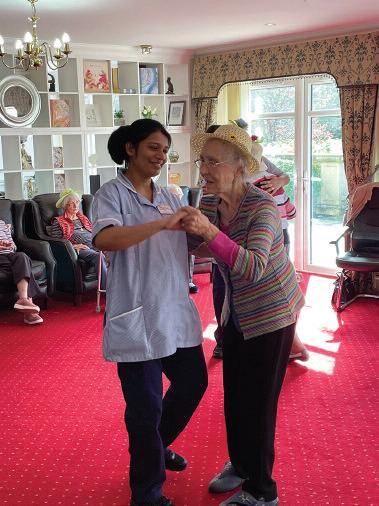
It has been an all singing and all dancing Easter for residents at Waterbeach Lodge in Cambridge this year thanks to visiting entertainer, Patrick Sawyer Patrick who regularly performs at care homes in the region visited Waterbeach Lodge over the Easter weekend to sing a selection of hits from across the decades And with everyone singing and dancing along while they donned Easter bonnets it was a bank holiday to remember Beverley Murray Registered Manager at Waterbeach Lodge said “We like to make sure our residents get the chance to celebrate special occasions throughout the year and it s been great to see everyone having fun today Thanks to Patrick for providing some excellent Easter entertainment Patrick Sawyer has been an entertainer for nearly 40 years and said that Waterbeach is one of his favourite homes to perform at He said: “I pick music that residents remember from their younger years and it s always wonderful to see them enjoying themselves I find entertaining and seeing the pleasure it brings a very rewarding way to make a living Waterbeach Lodge is part of AgeCare UK and Director of Care Jo Mason is delighted to hear about the care home’s Easter celebrations She said: At Waterbeach Lodge we foster a family approach focusing on enabling residents to live well It s wonderful to hear that residents have enjoyed the entertainment arranged for them this Easter and a huge thank you to staff for organising




As part of the festivities the Monmouthshire care home organised a cupcake decorating competition showcasing residents creative talents Each cupcake was judged on both taste and appearance adding a friendly competition to the day
Additionally the team thoughtfully gifted each resident with a plant pot complete with soil and seed paper to grow their own wildflowers bringing a touch of nature indoors

The celebration continued with the lively “Guess the Name of the Bunny game where family members and relatives had to guess the name for a chance to win a giant bunny –luxury hampers were also up for grabs with exciting gifts such as wine bath bombs Easter egg and much more creating a fun filled weekend for all Verity Walmsley Home Manager expressed The Easter weekend was so much fun and it was nice to see family members relatives and the local community come together to celebrate this special occasion”

Sundial Care Home welcomed the spirit of Easter with open arms this past weekend offering residents, who the home fondly refer to as family members a celebration filled with delightful activities and treats
To mark the start to the weekend the residential care home in Tipton St John looked forward to an afternoon of easter crafts and hot cross buns
Family members and team members came together to decorate charming crochet chicks and bunnies, crafted and handmade by a talented team member Easter bonnet making was also a popular choice of activity with the family members, everyone thoroughly enjoyed personalising and crafting their individual bonnets, encouraging creativity and

social interaction within the home
On Easter Sunday a treat trolly laid with an array of chocolate and sweet delights for everybody to choose from The family members were also amused to see the trolly was pushed by the Easter Bunny himself! The team will certainly remember the laughs and smiles that echoed throughout the home on that day
The Easter weekend at Sundial Care Home was a testament to the community's commitment to creating meaningful and memorable experiences for all family members As they reflect on the weekend s festivities Sundial Care Home looks forward to continuing to nurture a vibrant and inclusive environment for its family members to lead a true continuation of life

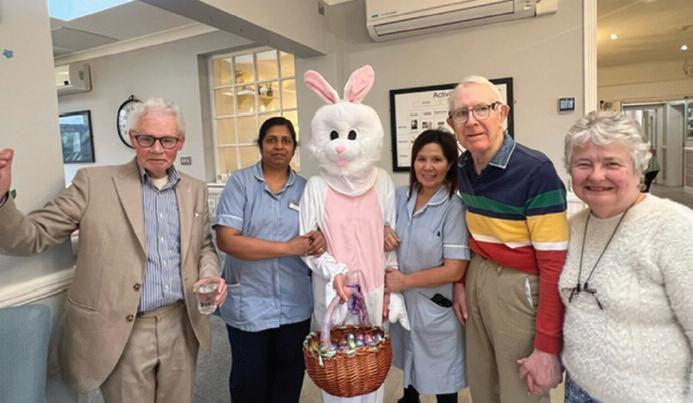











free from the usual worries associated with heating maintenance and repair Website www swiftresponseltd co uk Phone number 0800 577 0026 Email swiftresponseltd@gmail com See page 11






MOWOOT II - a revolutionary non-invasive solution to chronic constipation







•

machine life saving money
preventative maintenance Proper servicing extends
Reduce energy bills by preventing limescale build-up in machines – 1 mm of limescale can increase energy usage by 11%
Angloplas are

healthcare providers and who are employing a combination of infection prevention and control strategies including hand hygiene cleaning training and the adoption of new technologies to tackle the problem As a result a wide range of infection control products and technologies are emerging on the market including antimicrobial technology Angloplas range
are produced in the world s first proven Antimicrobial PVC with silver ion technology and which is exclusive to Angloplas This helps reduce the risk of cross infection by stopping the growth of bacteria and mould and works continuously for the lifetime of the product, reducing levels of bacteria such as MRSA, E Coli Legionella, Salmonella and mould by up to 99 99% For non-clinical environments
Angloplas has recently launched its new Budget Range of products which are made to the same exacting standards as the antimicrobial protected ones but with lower price tags
You can order Angloplas products directly from its website by going to www angloplas co uk







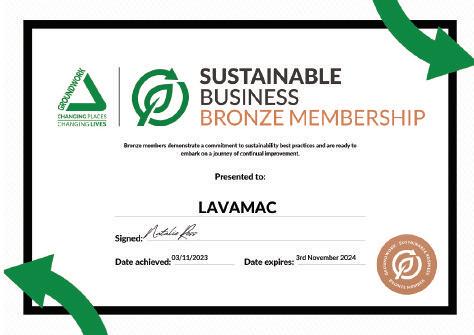



ories which are inspired by real experiences and are full of vibrant colours
Also a couple of our residents really enjoy tackling more challenging jigsaws I’m so impressed with how brilliantly they complete them; I certainly couldn t do as well as they do added Chelsey
“Puzzles are a very good pastime for our residents as they can improve mental speed and thought processes – and they are also a positive activity for improving short-term memory They can, of course be an individual activity but they are also a great group activity which creates opportunities for engaging with others chatting and conversations and making friends Daniel continued
Other benefits of puzzles include helping relaxation as by immersing yourself in a puzzle it can serve as an exercise in mindfulness and help to relieve stress For the elderly in particular the act of picking up puzzle pieces turning them over and fitting them together can sometimes but quite a challenge However puzzles are a great way to exercise the small muscles in fingers and eyes

“One of our residents told me that jigsaws can be traced back to the 18th Century when European map makers put their maps on to wood and cut them into small pieces They did this to create learning tools to teach geography – so really interactive puzzles have been around for quite a few hundred years Daniel continued I really do learn something new from our residents every day
“Our interactive Tiny Tablet is another example of our commitment to provide exceptional standards of quality care through person-centred care as all our residents can join in and take part in the group activities or use it on their own It’s up to them – they can do what they want to do when they want to do it ” Chelsey concluded
For more information on the Tiny Tablet see the advert on the facing page
Recreo VR headsets help improve the mental and social wellbeing of those you support with person-centered VR experiences Our fully managed service is a fun and exciting way to personalise care enhance activities and improve the quality of life of your residents
Our service has been designed for the care sector with an intuitive app which does not use controllers or difficult operating systems Our library of incredible experiences means there will be something for everyone! The headsets even work offline which is brilliant for domiciliary care and for those rooms where wifi doesn t reach VR is an impactful activity and can be really effective during one-to-ones in
group sessions alongside themed activities, and in reminiscence sessions for people living with dementia Our headsets and experiences have been co-designed with people living with dementia and Alzheimer s Society and have been shown to improve wellbeing and help recall memories
All headsets come with our full support and training to help integrate VR into your everyday care plans and activities
For more information or to schedule a demonstration, contact us at info@recreovr co uk or give us a call at 01482 526940 Visit our website at www recreovr co uk to discover the possibilities that Recreo VR can unlock for your care facility




By 2030 one in six people in the world will be aged over 60 (including me!) The WHO now outlines loneliness as a key risk factor for the wellbeing of people in later life As a potential solution we’re increasingly seeing AI companions championed for being virtual friends who will listen and talk to individuals With loneliness and feelings of isolation rife amongst the elderly and vulnerable it begs the question: could AI chatbots be beneficial in care?
In short we would argue no Here s why
INTERPERSONAL RELATIONSHIPS ARE KEY
Complex issues such as loneliness cannot be solved by technology alone AI chatbots may seem like a promising solution but they cannot replace the human element of companionship and care that is so essential especially for those who are vulnerable and have complex needs
Carers play a vital role in providing not only basic physical care but also emotional support and understanding This is especially important for individuals with disabilities who may feel isolated due to their condition or those with cognitive challenges and degenerative conditions such as Dementia
Chatbots are not suitable for everyone And in such cases human empathy is necessary to interpret the needs and communicate effectively with the patient
Empower carers and patients through technologies
The use of technologies such as AI in care must be evaluated to ensure it complements and enhances human connection rather than replacing it This means there must be careful consideration when proposing how to fit technology into the roles of those who may be the people patients see and talk to most as well as how it can be used to make the care journey better for patients
Although chatbots cannot replace human carers a combined approach of AI and other technologies can help care providers and facilitators
For example currently a typical caring schedule often includes three in-person visits per day for each patient However, due to time constraints, caregivers may have to rush these visits In this case, we would argue, that
technology can be used to allow carers to perform a more thorough in-person visit and follow up with two video check-ins based on the patient's needs (these video care calls can even of course be instigated from overseas)
Remote intelligent monitoring and predictive analytics can also be used by carers to capture an accurate overall picture of a patient s well-being to design better care programmes in advance rather than spending too much time during an in-person appointment on data capture
As well as improving patient-centricity, AI has the potential to streamline services for care facilitators by taking on mundane tasks and freeing up the caregiver's time and talent for creativity and innovation For example the administrative work involved in the daily operation of care providers and facilitators AI can handle emails user inquiries and information requests enabling users to access information quickly so management can focus on solving more complex issues efficiently
Ultimately the current care system is dealing with legacy and complex technology which has held back much-needed innovation While AI can be a potential solution many care providers see AI as a cost-cutting solution without first addressing the underlying issue of an inadequate care model
Digital transformation within the care sector should instead prioritise the needs of patients and carers rather than simply implementing technology for the sake of it Technology should add value to the care journey for example making it safer by vetting carers ID and training documents with banking-standard technology or reducing the time carers spend doing admin so they can focus on their vocation Similarly it should enable patients to access care easily and quickly so that they aren t stuck in the hospital and have better care outcomes
The successful implementation of AI in the care sector requires careful consideration of how it can meet the needs of patients And for that reason it’s not an effective way of combatting the loneliness of people in care AI cannot replace the crucial interpersonal relationships between carers and patients that build trust safety and companionship However it can help ensure carers have more time to put the needs of patients at the heart of their work The key to successful AI implementation in the care sector is putting the patient first
Care UK s luxurious new Oat Hill Mews care home in Leicestershire gets the latest in Smart TV and digital signage technology from Boltonbased TVC Technology Solutions in time for its recent opening Oat Hill Mews is a stunning new development by Care UK offering the best in assisted living on-site care health and wellbeing for residents
Designed as a showcase of Care UK s portfolio the Market Harborough venue boasts luxury accommodation an on-site hair and beauty salon a dedicated café an on-site cinema multiple lounges and a fully equipped bar
To complete this high-tech luxury venue Care UK asked long-term audio visual and domestic appliance supplier partner TVC Technology Solutions to furnish the luxurious bedrooms resident common areas and cafes with the latest in Smart TV technology Maintaining the cutting-

edge theme Care UK wanted the latest in digital signage throughout the main areas enabling them to show various guest information restaurant menus and entertainment schedules
With Oat Hill Mews officially opening at the start of 2024 the complete AV and digital signage systems were specified installed and tested well in advance Early visitors have already been impressed by the neat hightech and luxurious feel of Oat Hill Mews from the reception area with its HD digital signage to every bedroom featuring a 43in Smart TV on either articulating or swivel wall brackets to provide the best viewing experience to its residents
Heading up the TV-technology TVC specified its own-brand Mitchell & Brown Smart TVs in 43in screen size for every room These fully featured Freeview Play catch-up TVs with all of the apps for streaming services such as Netflix Amazon Prime Disney+ and Apple TV offer Full HD picture quality and are backed by Mitchell & Brown’s UK-based

foodservice solution to help make any dining experience exceptional Fairfax Manor in Harrogate acquired from Angela Swift Developments in 2023 and will shortly be open to new residents The home has been thoughtfully designed to offer an exceptional living environment with a range of outstanding facilities The newly recruited team are in place ready to warmly
ai

In the post pandemic world we have all seen the effects of supply chain problems with the invasion of Ukraine and other alarming global factors ever increasing costs of living and other more local issues which have driven up the rate of inflation over the last few years The impact of this meant that most manufacturers of electronic products had to increase their prices as costs spiralled This, of course, has impacted the end user The most dramatic impact has been on the Care Industry An industry that has lacked the support it desperately needs in these trying times
Courtney Thorne at the same time took a strategic decision to take a close look at our core products right down to component level the objective being to make us less vulnerable to future global supply chain issues and to reduce the cost of each product with the amin of ensuring that we deliver the same high quality product at a cost protected price We had to ensure that this would happen without jeopardising the superb levels of support we pro-













For over two decades Advanced has supported care organisations with innovative software which makes a vital contribution to managing workflows managing costs and achieving regulatory compliance
OUR SUITE OF SOLUTIONS
We provide a suite of software solutions for care organisations in residential domiciliary and supported living settings including:
Care Business Management: A comprehensive toolkit that equips you to manage your care business anytime anywhere ensuring smooth and efficient operations
Financial Management: Streamline your financial processes with tools designed to simplify the complexities of care finances making it straightforward and stress-free
People Management: From recruitment to retaining valuable staff our solutions make managing your team not just easier but more effective

• Governance and Risk Management Stay ahead of the curve with our integrated software ensuring compliance in your operations and effective risk management
• Workforce Management: Maximise your team s potential through intelligent rota and shift planning ensuring the right people are in the right places at the right times





It records not just the de-escalation techniques used, but also their effectiveness This data is exported to a welldesigned behaviour plan, or ‘Smart Plan Our customers have experienced significant reductions in behaviour incidents, with some reporting over an 80% reduction after using Behaviour Smart for just one year Dean Cotton, Director, Behaviour Smart info@behavioursmart co uk www behavioursmart co uk PASS supports


Like it or not, financial accounting is crucial to the operations of your care home Without accurate reports, you cannot make proper forecasts, build accurate budgets, get paid on time by multiple funders and keep bed occupancy at optimal levels
Unfortunately, many care homes don’t have the time or budget to invest in powerful, care home accounting software This results in a vicious cycle where financial teams are so busy running manual tasks that they cannot take the time to improve their accounting systems, only to find each year they are farther and farther behind the technology their care home will need in order to thrive in the long term
Cloud Doing
a licensed partner of Oracle NetSuite, is here to stop that vicious cycle We believe care homes should have access to enterprise-level software without ballooning their budgets, so we donate the base software with up to three users to qualifying non-profit care homes
You know better than anyone that care home management is complex, and we know better than anyone that care home accounting gets complicated fast Balancing income for each resident from Councils, private sources, and family members requires detailed billing practices Add on top of that multiple legal entities, multiple care homes, the need for timely occupancy tracking and your finance team quickly becomes bogged down in repetitive, manual, and frustrating work
To make it worse, most accounting software are designed for slick enterprises (and priced for slick enterprise budgets) That leaves too many care home finance teams battling spreadsheets and duplicate reports to accomplish basic care home accounting tasks
Cloud Doing Good partners with care homes to
implement Oracle NetSuite’s enterprise-grade accounting software at as low a price as possible Here’s how Cloud Doing Good simplifies your care home’s accounting:
Pull all your financial data into a single platform Even with multiple legal entities, multiple care homes, complex billing structures, bed occupancy tracking, resident admissions and departures and additional unique needs, our system aggregates all the pieces of information into a single repository
Whether you need to get an overview of last year’s spending or forecast income, you can run the necessary reports in a matter of clicks This makes it simpler for your team to build forecasts, track spending, track bed occupancy and the financial implications in real time, and manage billing and collecting resident payments easily
When it comes to your financial systems, you need financial experts not call centre IT to set you up for success After all, with cloud software the IT should be pre-built and proven With pre-built base software, we

match our experienced system accountants with your project to make sure it reflects your accounts, your finances, and your people So you get not just powerful accounting software, but confident end users within as little as 15 chargeable days From the start of the project through your first month’s ends, you will have a team of system accountants on call to walk you through doing the day job on the new system
Cloud Doing Good’s mission is to bring streamlined accounting management to organisations that deserve it, so we keep it simple For qualifying non-profit care homes, we donate the base Oracle NetSuite software, including up to 3 users and unlimited UK entities This way, you can upgrade to enterprise-level accounting management without ballooning your budget

When you partner with Cloud Doing Good, you get access Oracle NetSuite’s award-winning accounting management software 25+ years of investment and trusted by over 1 million users, Oracle NetSuite safeguards your data in a cloud network with the latest security protocols and automatic updates to protect against breaches We’ll also integrate the platform into your existing data security structure for smooth, uninterrupted, and safe operations as needed This way, you can focus on your care and let us worry about cybersecurity Don’t risk your data and care home on a solution running small numbers of customers: Oracle NetSuite is powering 38,000+ organisations
We stand ready to simplify your care home’s accounting. Reach out to discuss your needs:
Iain Goldmann, Director
iain@cloudoingood.com
Mobile: 447404354865
LinkedIN:

www linkedin com/in/iaingoldmann/
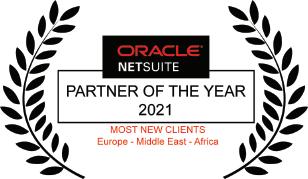

trust and transparency in the UK care sector through patient verified reviews when choosing carers
The partnership will address the critical need to improve patient experiences where only 14% of households are satisfied with care services
Providing more choice confidence and quality of care for patients and their families is therefore essential – and that s exactly the goal of the Curam and Doctify partnership
Doctify gives patients quick access to genuine independent and verified reviews of carers to find the best carer to suit their needs for at-home care These are anonymised based on the experiences of other patients and cover aspects such as the quality of specialists their services and treatments

Patients can then click through to Curam to connect with the carers with the expertise and availability that they need in real time Not only does this ensure that patients have complete control over their carer selection and the opportunity to form consistent trusting relationships but Curam’s


one outstanding application package

A new accredited qualification for care workers will help to improve perceptions of the sector and will boost retention
That s the opinion of a Lesley O Connor Head of Strategic Development at Realise a leading training provider which offers numerous qualifications in the sector
Lesley welcomed the Government s £75m investment to help people progress in their Heath & Social Care careers
The Government recently set out plans for a new accredited qualification and a national career structure for the adult social care workforce
It says the qualification will benefit around 37 000 workers within the sector while the defined career pathway will help people plan their future progression
But Lesley said while the funding package would make adult social care a more attractive proposition, it would likely only make a small differ-
ence to the 152 000 vacancies within the sector
This Government investment to add accreditation to the Level 2 Adult Social Care Certificate is very welcome and it will give the qualification additional value said Lesley
A clearly defined career pathway is also something I have championed for a long time and it offers people a clear route to progress their careers
It will also help to improve perceptions of adult social care as a whole
People still think of adult social care as looking after old people and everything that goes with that but the opportunities are far more varied including helping young people with disabilities and assisting with treatment and recovery from addiction
“I hope it will encourage school leavers to consider adult social care as a viable skilled career with progression opportunities rather than a stopgap It will undoubtedly help to raise the profile of the sector and will give people with limited qualifications the chance to build their skills
“It’s well-known that people stay longer at places where training is available ”
People in adult social care jobs will be able to enrol on the new Level 2
Adult Social Care Certificate qualification between June this year and March 2025
There will be other training initiatives available, including a new digital leadership qualification to help managers in the sector with the implementation of technology
But Lesley warned that this funding must be followed up with decisive Government action to plug the gap in care sector vacancies
She said “There is a bigger conversation to be had at a time when there are 152 000 vacancies within adult social care It is predicted we will need 440 000 care workers by 2035
“While this is a good starting point the Government must pledge future funding to support the long-term sustainability of the sector to attract many more people into roles at all levels If decisive action is not taken soon we could be facing unimaginable consequences over the next decade
Valuing the current workforce and giving them opportunities to upskill is important but ultimately pay and conditions need to improve to attract new blood into the sector rather than going into retail or hospitality
Realise is one of the country s leading training providers working with more than 1 000 employers and more than 10 000 learners a year throughout apprenticeships and adult education courses
For more information visit https://bit ly/realisetraining

remain compliant; they also benefit from best practice policies and procedures that provide a solid foundation for safe working practices and – ultimately – protect and support service users and staff Ben Erskine – Director at W&P Compliance & Training www wandptraining co uk | Tel: 01305

At The Health & Safety Group, we understand that the process of getting your care workers through their Care Certification can be pretty demanding So we ve made it our mission is to make the training process as flexible and accessible as possible without increasing your costs or sacrificing the quality of our courses
We recognise that some prefer traditional classroom learning for the benefits of immediate instructor feedback hands-on skills practice and connecting with likeminded professionals
However if committing to fixed schedules and locations proves difficult staff may favour the unmatched flexibility of e-learning Our online courses allow caregivers to learn at their own pace, fitting training around their commitments while benefitting from rich multimedia resources
However you learn HSG offers the best of both worlds With classroom courses available nationwide 6 days a week we provide exceptional accessibility for face-to-face training Our dedicated e-learning platform ensures flexibility enhanced by our Training Team s support for any queries From Medical Administration to Safeguarding Adults or Catheter Care, all courses are crafted by industry experts, ensuring that training prepares staff for real-world situations using practical skills
Our Care Certificate Training Course designed specifically for care workers healthcare assistants and social care support workers is just one of our high-impact training courses available both face-to-face and online through our e-learning platform Mapped to the ‘Skills for Care’ Care Certificate standards this course equips caregivers with the fundamental skills and knowledge necessary to navigate the complexities of their roles empowering them to deliver comprehensive compassionate care
Get in touch with me today at beth@hsg-group com to learn more about our training options
We re committed to tailoring training to your needs so you can focus on delivering outstanding care!



















